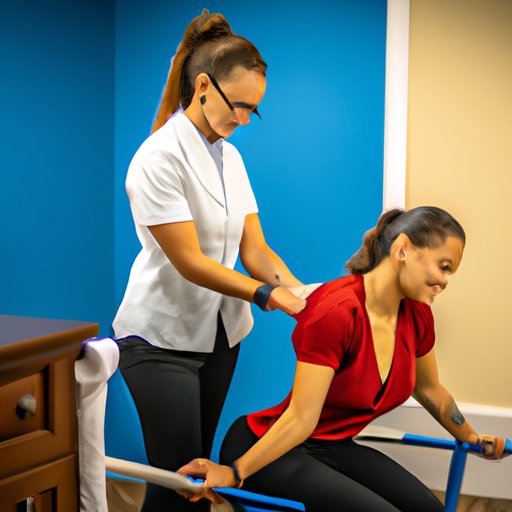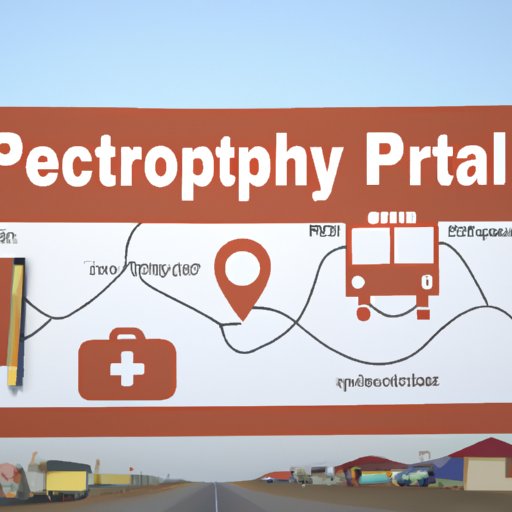Introduction
Travel physical therapy is an exciting career path that allows you to work in various locations while still using your clinical expertise to help patients improve their quality of life. As a travel physical therapist, you’ll have the opportunity to explore new places, build relationships with different healthcare organizations, and gain valuable experience in a variety of settings.
This article will provide an overview of what it takes to become a travel physical therapist and how to find the perfect position. We’ll look at the educational requirements, licensure and certification needs, and the skills necessary to be successful in this role. Additionally, we’ll cover networking tips for finding a job and strategies for making the most of a travel physical therapy assignment.
Educational Requirements
The first step in becoming a travel physical therapist is obtaining the right educational qualifications. To practice as a physical therapist, you must obtain a Doctor of Physical Therapy (DPT) degree from an accredited program. This typically takes three years of full-time study after completing an undergraduate degree.
In addition to obtaining a DPT degree, you must also meet the state licensure requirements in order to practice physical therapy. Licensure requirements vary by state, but generally include passing an exam and completing a certain number of hours of supervised clinical experience. You may also need to complete continuing education courses to maintain your license.
Finally, you may want to consider obtaining specialty certification in a particular area of physical therapy. Specialty certifications can demonstrate your expertise and make you a more attractive job candidate.
Skills Needed to Be Successful as a Travel Physical Therapist
In addition to the educational requirements, there are certain skills you’ll need to be successful as a travel physical therapist. These include:
Clinical Knowledge and Expertise
One of the most important skills for a travel physical therapist is clinical knowledge and expertise. You should have a thorough understanding of the anatomy, physiology, and pathology related to the conditions you’re treating. You should also have knowledge of therapeutic interventions, including manual therapy, exercise prescription, and modalities.
Communication and Interpersonal Skills
As a travel physical therapist, you’ll be working with a variety of people, from patients to other healthcare professionals. It’s essential that you have excellent communication and interpersonal skills. You should be able to clearly explain diagnoses and treatments, as well as build trusting relationships with patients and colleagues.
Adaptability and Flexibility
Successful travel physical therapists must be adaptable and flexible. You’ll be working in different environments, with different people and protocols. You must be able to quickly adjust to new situations and handle unexpected changes without missing a beat.

Finding Travel Physical Therapy Positions
Once you’ve obtained the necessary qualifications and developed the skills needed to be successful as a travel physical therapist, it’s time to start looking for positions. Here are some tips for finding the perfect position:
Networking and Job Search Platforms
Networking is an important part of any job search, especially for travel physical therapy positions. Reach out to colleagues, friends, and former classmates who may be aware of available positions. You can also use job search platforms, such as Indeed and LinkedIn, to find openings in your desired location.
Working with Recruiters
Another option is to work with recruiters who specialize in travel physical therapy jobs. They can help you find the best positions and provide guidance on the application process. Working with recruiters is a great way to ensure you’re getting all the information you need to make an informed decision.

Making the Most of a Travel Physical Therapy Assignment
Once you’ve accepted a travel physical therapy assignment, you’ll want to make the most of it. Here are some tips for doing just that:
Researching the Area Before Accepting an Assignment
Before accepting a travel physical therapy assignment, it’s important to do your research. Learn about the area, its culture, and its climate. This will help you determine if it’s the right fit for you and give you an idea of what to expect once you arrive.
Taking Advantage of Opportunities to Learn and Grow
Travel physical therapy assignments are a great opportunity to learn and grow. Take advantage of the chance to work with different colleagues and explore new techniques. You can also attend conferences and workshops to stay up to date on the latest developments in the field.
Conclusion
Travel physical therapy is a rewarding career path that offers the chance to explore new places while using your clinical expertise to help others. To become a travel physical therapist, you must obtain a Doctor of Physical Therapy degree and meet the state licensure requirements. You should also develop clinical knowledge and expertise, communication and interpersonal skills, and adaptability and flexibility. Finally, you’ll need to network and use job search platforms to find travel physical therapy positions and take advantage of learning opportunities during assignments.
(Note: Is this article not meeting your expectations? Do you have knowledge or insights to share? Unlock new opportunities and expand your reach by joining our authors team. Click Registration to join us and share your expertise with our readers.)
